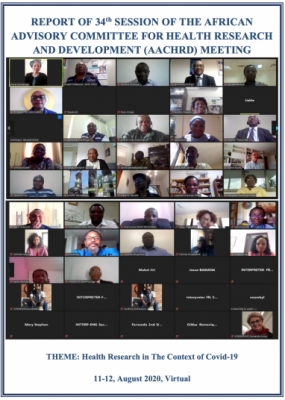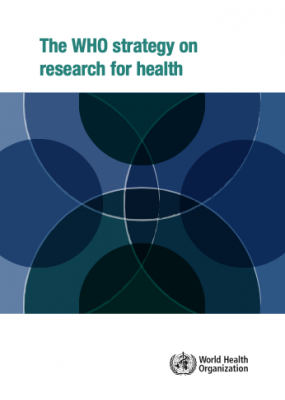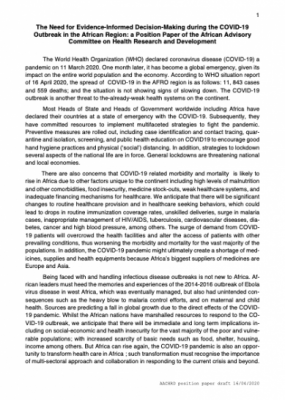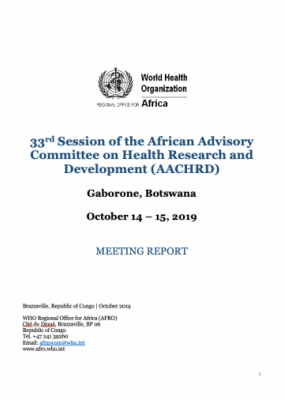The African Advisory Committee on Health Research and Development
Overview
The African Advisory Committee for Research and Development is a multidisciplinary, multi-sectorial body established in 1979, to provide advice to the Regional Director on matters of research related to health policies and development strategies.
The AACHRD has a consultative mandate to help the Regional Office contribute to the Organization’s second core function, i.e. “shaping the research agenda and stimulating the generation, translation and dissemination of valuable knowledge.”
The Committee draws its membership from among members of WHO regional expert panels, Academia, WHO Collaborating Centres, and national professionals. Members of the committee, consisting of 15-20 experts, are appointed in their personal capacities by the Regional Director. They do not represent their respective governments of Associations. However, governments are informed of the participation of their nationals in the AACHRD.
The Committee usually meets annually to deliberate on issues related of their mandate.
More on the African Advisory Committee for Research and Development
Members
The African Advisory Committee on Health Research and Development members
The current members of the committee are:
AACHRD members
Professor Fatou Sarr Sow
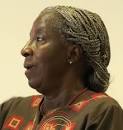
Professor Fatou Sarr Sow is Senior Lecturer at Fundamental Institute of Black African (Institute Fondamental de l'Afrique Noire) (IFAN)in Cheikh Anta Diop University in Dakar, where she directs the Scientific Research on Gender and Science which she created in 2004. Before joining the Cheikh Anta Diop University of Dakar in 1999, she taught at the University of Our Lady of Peace in Namur, Belgium, and at the National School of Social Workers of Dakar.
Professor Sow is also a gender specialist in UN agencies for the training, evaluation and development of gender programs in 15 African countries. She holds a doctorate in Anthropology and Sociology of Politics from Paris VIII University, a doctorate in Social Work / Social Policy from Laval University, a Drug Enforcement Administration (DEA) in Environmental Sciences from the University of Dakar and a Master in Economics of Development of Aix Marseille II Faculties.
Professor Sow is the author of several books and articles on women's entrepreneurship and the transformation of power relations in Senegal and the political struggles and resistance of women in Africa. She has conducted extensive research in Senegal and the subregion. She is Knight of the National Order of the Lion. She was nominated as a leading educator in 2008 by Forum for African Women Educationalists (FAWE), a title awarded to only ten women educators who contribute to the promotion of education in Africa.
Pierre Ongolo-Zogo (Deputy Secretary AACHRD)

Pierre is a leading health systems researcher in the African nation of Cameroon. He studied in the Health Policy PhD program at McMaster University during 2012 as part of an exchange program with Makerere University in Kampala, Uganda. His thesis is focused on evaluating initiatives to support evidence-informed health policymaking in Cameroon and Uganda. Pierre holds a medical degree from Université Poincaré, in Nancy, France, a fellowship in radiology and medical imaging at Université C. Bernard in Lyon, France, and an M.Sc. in biomedical engineering from Université J. Fournier in Grenoble, France.
He is also founder and director of the Center for Development of Best Practices in Health, and chief of radiology and the medical imaging unit, at Yaoundé Central Hospital, and an Associate Professor, Faculty of Medicine and Biomedical Sciences, at the University of Yaoundé I. He is supported through the International Development Research Centre (IDRC) International Research Chair in Evidence-Informed Health Policies and Systems, which is held by Nelson Sewankambo (Makerere University) in partnership with John Lavis (McMaster University).
Obinna Onwujekwe
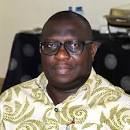
Obinna E. Onwujekwe is Professor of Health Economics and Policy and Pharmacoeconomics in the Departments of Health Administration & Management and Pharmacology and Therapeutics, College of Medicine, based in University of Nigeria.
Onwujekwe qualified as a medical doctor from University of Nigeria and later obtained a MSc in Health Economics. He obtained a Certificate in District Health Management from the Swiss Tropical Institute Basel. He then proceeded to the United Kingdom where he bagged a PhD in Health Economics and Policy from the London School of Hygiene and Tropical Medicine.
Onwujekwe was a member of a DFID-funded Consortium for Research on Equitable Health Systems (CREHS) from 2006 to 2010. He was also a member of the European Commission-funded Eval-Health project from 2011 to 2014. He was also the Dean in the Faculty of Health Sciences and Technology at UNN between August 2012 to July 2014; and the Head of Department of Health Administration and Management between 2005 and 2012.
Since 2007, Onwujekwe has served as a Director at the West African Health Economics Network (WAHEN). He has also been the National Coordinator of the Nigerian Malaria Control Association (NaMCA) from 2009; the President of the Nigerian Health Economics Association (NiHEA) since 2010; and the Chairman of the University of Nigeria Senate Research Grants Committee since 2014
Onwujekwe conducts research on health economics - especially looking at the impact of the stigma of HIV/AIDS in Nigeria on the willingness to access anti-retroviral drugs,[3] and malaria prevention strategies.[4] His work has been important in informing international aid agencies such as DFID's aid agencies
Dr Salim Abdulla
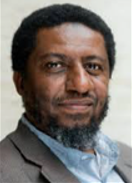
Dr Salim is co-chair of VCAG since November 2018, member since 2017, Principal Scientist, Ifakara Health Institute, Tanzania
Dr Salim Abdulla is a Clinical Epidemiologist and former Chief Executive Director of the Ifakara Health Institute (IHI). He serves as member in various technical and advisory committees at national and international level including the African Advisory Committee on Health Research and Development of the WHO Africa Region. Current work is focused on evaluation of new interventions for malaria including diagnostics, insecticide treated nets, drugs and vaccines, conducting field trials from Phase I to Phase IV. He leads the malaria clinical trials programme at IHI with work in Tanzania and Equatorial Guinea. He also has interest in the translation of research results into policy, clinical epidemiology and capacity development issues. He has published extensively on malaria and received the centenary medal of the UK Royal Society of Tropical Medicine and Hygiene and the Donald Reid Medal from the London School of Hygiene and Tropical Medicine for contributions in epidemiology and malaria control.
Professor Charles Shey Wiysonge
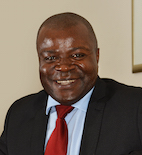
Centre, at the South African Medical Research Council. The vision of Cochrane South Africa is that healthcare decision-making within Africa will be informed by high-quality, timely and relevant research evidence. He is also a Professor in the Department of Global Health at the Faculty of Medicine and Health Sciences, Stellenbosch University, South Africa. Professor Wiysonge was previously the Deputy Director of the Centre for Evidence-based Health Care, Head of the Knowledge Translation Unit, and Head of the Implementation Research Regional Training Centre at Stellenbosch University, South Africa. His appointments prior to joining Stellenbosch University included Project Manager of the Vaccines for Africa Initiative and Chief Research Officer at the University of Cape Town, South Africa; Chief Research Officer at UNAIDS, Geneva; Deputy Permanent Secretary in the Central Technical Group in charge of the Expanded Programme on Immunisation, Cameroon; and Medical Epidemiologist at Centre Pasteur du Cameroun, Yaoundé, Cameroon.
Professor Wiysonge obtained the Doctor of Medicine (MD) degree from the University of Yaoundé I, Cameroon (MD); a Master of Philosophy (MPhil) from the University of Cambridge, United Kingdom (UK); and a Doctor of Philosophy (PhD) from the University of Cape Town, South Africa. He also undertook postgraduate non-degree research training at the UK Cochrane Centre and the University of Oxford, UK. He is a Member of the Academy of Science of South Africa.
Professor Wiysonge is a member of the GRADE Working Group; Gavi Independent Review Committee; WHO African Regional Committee on Health Research and Development; GREAT (Guideline‐driven, Research priorities, Evidence synthesis, Application of evidence, and Transfer of knowledge) Network; and other international scientific and policy advisory committees in the fields of immunisation, evidence-based health care, and implementation science.
Professor Wiysonge’s research interests include immunisation, health system strengthening, and knowledge translation / implementation science. He was knighted by the Presidency of Cameroon with the National Order of Valour, the highest honour in Cameroon, in the category “Chevalier".
Flavia Senkubuge (Chair of AACHRD)
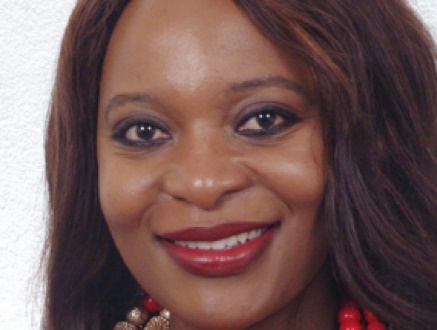
Dr Senkubuge has a medical degree from University of Pretoria, a specialist medical degree in community medicine, holds a Fellowship of the College of Public Health Medicine of South Africa (obtained in 2009), and is completed her PhD in 2020. The work of this global public health advocate is rooted in the philosophy of ubuntu (“I am because we are”). She collaborates in Africa and globally in areas that include global health diplomacy, tobacco control, health policy and management, leadership, universal health coverage, the UN’s Sustainable Development Goals, and the social determinants of health.
She was elected first black woman President of the Colleges of Medicine of South Africa (CMSA). Dr Senkubuge, who is the acting chair of UP’s School of Health Systems and Public Health, is the youngest president of the CMSA and the first specialist in public health medicine to hold the position. She is also the first black woman and only the third woman in the CMSA’s 64-year history to be appointed President.
She has been instrumental in many firsts in the region and the world, particularly in her field and area of public health. She achieved acclaim by being the first black woman president of the 17th World Conference on Tobacco or Health, one of the largest policy conferences, which was held for the first time in its 75-year history in Africa, in March 2018 in Cape Town. She was instrumental in putting together the winning bid.
Dr Senkubuge also holds several significant positions. She is secretary of the College of Public Health Medicine and Vice-President of the African Federation of Public Health Associations (AFPHA), which advocates and promotes public health in Africa, and collaborates globally to achieve its mandate of health for all Africans. As secretary of the WHO/AFRO African Advisory Council on Research and Development (AACHRD), she advises the WHO/AFRO regional director on matters concerning health research and development in Africa. And she is the executive director of Public Health Africa, an Africa-led, globally supported non-profit organisation.
Francine Ntoumi
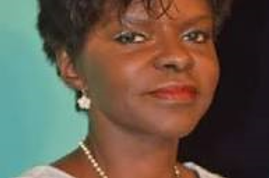
Francine Ntoumi was born in 1961 in Brazzaville in the Republic of Congo. After a primary cycle and part of her high school in Brazzaville, Congo, Francine Ntoumi settled in France and obtained her BEPC and her baccalaureate at the Marie Curie High School in Sceaux, in 1975 and 1978 respectively. She holds a degree in Biology (1989), then a PhD in Science from Pierre-et-Marie-Curie University (1992), she began her career in malaria research (immunology and molecular epidemiology) at the Institut Pasteur in Paris1.
She first worked at Franceville in Gabon as a research fellow at the International Center for Medical Research (1995-2000). She was Head of Laboratory at the Medical Research Unit of the Albert Schweitzer Hospital in Lambarene, Gabon, and the Institute of Tropical Medicine / Faculty of Medicine at the University of Tübingen, Germany (2000-2005). Chief Scientific Officer of the European Developing Countries Clinical Trials Partnership (EDCTP), The Hague, The Netherlands (2006-2007), she coordinated the Multilateral Initiative for Malaria Initiative Secretariat in Dar es Salaam. Tanzania (2007-2010).
As the first African woman to head the Multilateral Malaria Initiative Secretariat, Francine Ntoumi is very committed to building health research capacity on the African continent. This commitment has earned him the coordination of the Central African Regional Network on Tuberculosis, HIV / AIDS, and Malaria (CANTAM) 1. Francine Ntoumi is a member of numerous international scientific committees including the Global Health Scientific Advisory Committee of the Bill and Melinda Gates Foundation2.
President of the Congolese Foundation for Medical Research (www.fcrm-congo.com) which she created in 20083, she is also head of laboratory and associate professor at the Institute of Tropical Medicine of the University of Tubingen in Germany since 2010 and teacher-researcher at the Faculty of Science and Technology of Marien N'Gouabi University of Brazzaville1 since 2014.
Prof. Margaret Gyapong
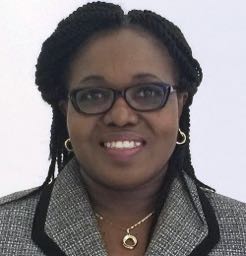
Professor Margaret Gyapong is the Director of the Institute of Health Research and Director of the Centre for Health Policy and Implementation Research of the University of Health and Allied Sciences in Ghana. Prior to this, she was the Director of the Dodowa Health Research Centre, Deputy Director for Research and Development of the Ghana Health Service, Adjunct Professor of International Health at the Georgetown University in Washington and Adjunct Professor in Medical Anthropology at the Brunel University of West London. She is a Medical Anthropologist and Cultural Epidemiologist by training.
Prof. Gyapong trained for her first degree in Home Economics at the University of Ghana, pursued her masters in Medical Anthropology at the Brunel University, West London and later on obtained a PhD in cultural Epidemiology from the Swiss Topical Institute and University of Basel in Switzerland.
She worked as Assistant head of Field work during the Ghana Vitamin A Supplementation Trials at the Navrongo Health Research Centre. She became a Research officer at the Health Research Unit of the Ghana Health service and rose through the ranks to become Deputy Director of the Research and Development Division of the Ghana Health service and foundation director of the Dodowa Health Research Centre.
Professor Gyapong’s areas of research are Malaria, Gender and Neglected Tropical Diseases, Maternal, Neonatal and Child Health, Demographic Surveillance Systems, Health Systems and Implementation research. She has served as chair/member of a number of WHO/TDR Committees. She serves on several international research review committees and boards including EDCTP. She has over 70 publications in peer-reviewed journals, Technical reports, several conference presentations, and 2 book chapters on Neglected Tropical Diseases.
Dr Modest Mulenga
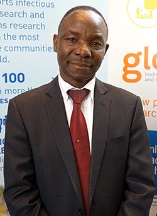
Chair of TDR’s Joint Coordinating Board Dr Modest Mulenga grew up in a humble environment. He has a Master of Science degree in clinical tropical medicine with distinction at the London School of Hygiene and Tropical Medicine and went back to Zambia. Two years later he was promoted to head the Department of Clinical Sciences of the Tropical Diseases Research Centre (TDRC) at the Ndola Central Hospital, one of the centres set up by TDR at its inception, and started looking for an alternative to chloroquine.
Modest ran clinical trials for a number of new antimalarials, and he received support from TDR to test new artemisinin-combination treatments that are now the mainstay of malaria care. TDR also provided him with a scholarship to go back to the London School of Hygiene and Tropical to complete a PhD in infectious and tropical diseases.
In London, Modest studied potential malaria therapies for children that could prevent the complications of severe anemia that was a major health risk for this disease. He was trying to find drugs that would keep blood levels healthy and avoid blood transfusions, which at that time put children at risk of contracting HIV.
Modest has continued to conduct research while heading TDRC as director. He has also brought his hard-earned experience back to TDR, this time as chair of the Joint Coordinating Board, TDR’s highest governing body.
In his current work with Professor Bill Moss of Johns Hopkins University, they have shown that school-aged children were not included in malaria educational and control programmes, housing conditions in rural areas allowed mosquitoes to breed and bite, and there was little training that helped people understand how to prevent the disease and accept the interventions. “I could see that other players needed to come on board,” he explains. “It has to be a multi-sectoral approach – we need teachers, housing and environment experts involved, and ideas from political, economic and business sectors to make the interventions easily accessible.”
He feels strongly that the use of research evidence needs to be expanded and intensified in order to better implement disease control or elimination programmes, and he wants to see more research capacity created in the countries most affected by infectious diseases such as malaria and HIV.
Dr Portia Manangazira
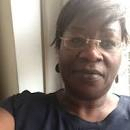
A Zimbabwean by nationality, Portia is the Director Epidemiology and Disease Control in the Ministry of Health and Child Welfare, Zimbabwe
As Director of Epidemiology and Disease Control at the MOHCC, Dr Manangazira responsibilities span the control of communicable, non-communicable diseases, health promotion and health information, and involve the planning, coordination and management of public health programs, the development, implementation, monitoring and evaluation of health information, disease prevention and control including emergency preparedness and response, (EPR) policies, and strategies. She is responsible for continuously monitoring of the effectiveness and efficacy of service delivery methods and procedures and taking appropriate action; providing national leadership, coordination and management of communicable and non-communicable diseases prevention and control programs. In the near future, it is expected that NCDs will be the highest burden of illness in Zimbabwe and sub-Saharan Africa. The key to reducing morbidity and mortality due to NCDs is prevention, early detection and treatment. In view of the paucity of data on NCDs, the last risk factor survey having been conducted in 2005, there is need to stimulate NCDs research in the country, while ensuring that the whole continuum of care is strengthened in order to reduce this current high wave of NCDs catastrophies.
Dr Tewabech Bishaw
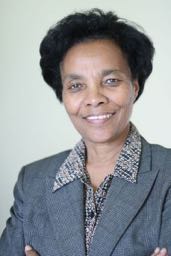
Dr. Tewabech Bishaw, born and raised in Jimma, Ethiopia, is a passionate public health specialist who has spent over 40 years in the sector. A people’s person who has spent a lifetime in service of the health and well-being of Ethiopians, Dr. Tewabech is driven by focusing her life on people centered activities and matters concerned with human rights, equality, justice and freedom. AWiB’s 2018 Lifetime Achievement Award honors the life and work of Dr. Tewabech Bishaw – A Public Health Devotee.
Dr. Tewabech has contributed immensely to the improvement of the health service delivery of Ethiopia. First as a Health Officer responsible for a Health Center which catered the health service delivery for about 500,000 at that time. At the capacity of Department Head of Health Education and Training Program she contributed a lot in the overall areas: training, developing curriculums and the overall activities of the Ministry of Health
Dr. Tewabech is one of the founding members of the Ethiopian Public Health Association which was established over 26 years ago and faithfully served as its president twice. She is also founding member and currently the Secretary General of the African Federation of Public Health Associations established in 2011. It is an umbrella of National Public Health Associations and Networks that covers all African countries. The main aim is to enable public health professionals to actively engage through their associations to further develop the health care system within their countries. Under the umbrella, there are 33 registered associations from 53 countries. From the 33 registered associations, 28 are actively participating. In her ongoing championing of public health, Dr. Tewabech sees her current role as the strengthening of the African Federation of Public Health Associations toward enabling them to take stronger actions within their countries
Prof. Seni Kouanda
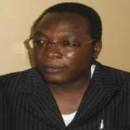
Professor Seni Kouanda is from Burkina Faso. He is a senior researcher, head of biomedical and Public health of “Institut de recherche en Sciences de la santé”IRSS. Seni is also Professor of public health (epidemiology), deputy director of “Institut Africain de santé publique” as well as EDCTP senior Research Fellow
He received his training from diverse institutions, including ICH GCP Training, ECCRT Brussels; Clinical Research Training for Investigators, ECCRT Brussels; Clinical research Training for Senior research CRAs, ECCRT Brussels; PhD in public health, School of Public health, Université catholique de Louvain (Belgium); Doctorate in medicine, University of Ouagadougou among others.
He has led and participated in many research projects, some of which include Post-Pregnancy Family Planning, Nutrition and the Essential Newborn Package (consortium Intrahealth, Path, HKI and IRSS) funded by Bill and Melinda Gates Foundation, and Maternal sespis study. Funded by WHO/HRP. Others include multicountry study on abortion complications funded by HRP/WHO and effectiveness of a package of postpartum family planning interventions on postpartum family planning uptake: a cluster randomized trial, WHO/HRP among others.
He is currently the regional coordinator for francophone Africa countries: Benin, Burkina Faso, Niger,DRC, Chad. He is also the regional coordinator for francophone Africa countries: Benin,Burkina Faso, Mali, Sénégal, Cameroun, Chad), and a senior fellow of EDCTP.
Pascal Bovet

Pascal Bovet obtained his MD degree from the University of Lausanne (Switzerland) and a MPH from UCLA (Los Angeles). He is board certified (FMH, Switzerland) in both internal medicine and public health. Based in the Institute of Social and Preventive Medicine of the University Hospital of Lausanne, where he is an associate professor, he has led epidemiological research in the area of cardiovascular disease in Switzerland, Tanzania and Seychelles and has also been actively involved with public health interventions, including the development of comprehensive tobacco control legislation in Seychelles. He has authored or co-authored over 200 publications. He often serves as a technical adviser for the WHO in relation to surveillance, tobacco control, CVD prevention, and evaluation of NCD programs. He is a faculty in several international courses on cardiovascular epidemiology and prevention with the University of Lausanne, WHO, CDC, and other organizations.
Docas Kamuya (Secretary AACHRD)

Dorcas is Researcher in Ethics and Community Engagement on the Global Bioethics Network. Her role includes: facilitating the strategic development of community engagement activities at the KEMRI-Wellcome Trust Unit in Kilifi, Kenya; coordinating Global Bioethics Network activities aimed at encouraging the sharing of expertise in community engagement between the Wellcome Trust Major Overseas Programmes (MOPs) in Kenya, Thailand, Malawi, Vietnam, and South Africa; and developing and leading a research programme around the development and evaluation of methods of community engagement.
Before joining the Ethox Centre, Dorcas was employed at the KEMRI-Wellcome Trust Research Programme (KWTRP), Kilifi, Kenya. Her roles, as the Community Liaison Manager included setting-up mechanisms for engaging with over 260,000 residents often involved in health research, strengthening collaborative partnerships between KWTRP and key health stakeholders, providing support to research interface staff (especially fieldworkers), and carrying our action research around these activities. Together with her colleagues at the Health Systems Research Department (HSR) at KEMRI-WT, they have published papers on their experiences around ethics of conducting in developing countries.
Dorcas has a PhD from the Open University, UK; a Masters in Public Health (health promotion) from London School of Hygiene and Tropical and a BSc. in Agricultural Economics from Egerton University, Kenya. Her PhD, titled “Negotiating research participation in community-based studies: Fieldworkers’ roles, and implications for ethical practice”, drew on social science methodologies to explore the practical and ethical challenges fieldworkers at the interface of research implementation faced, and the systems they drew on to resolve and/or negotiate out of these challenges. Her research interests include ethical implications of community engagement processes in international collaborative research in developing countries; exploration of drivers of CE in health research, and of different models; ethical and practical challenges and dilemmas for research staff at the interface of research implementation.
Abdoulaye Djimde (Deputy Chair, AACHRD)
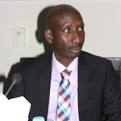
Abdoulaye Djimdé is an Associate Professor of Microbiology and Immunology in Mali. He works on the genetic epidemiology of antimalarial drug resistance and is a Wellcome Sanger Institute International Fellow. He is Chief of the Molecular Epidemiology and Drug Resistance Unit at the University of Bamako Malaria Research and Training Centre
Djimdé earned a doctorate in pharmacy in 1988 at the University of Bamako. He opened his own pharmacy and realised that people needed more effective methods to treat malaria. He began to volunteer with Ogobara Doumbo at the new Malaria Research and Training Centre, and moved to the University of Maryland, Baltimore County to complete a PhD. He worked with the National Institutes of Health and identified the first molecular marker of chloroquine resistant malaria.[2][1] During his PhD he joined the American Society of Tropical Medicine and Hygiene
In 2005 Djimdé was awarded a Howard Hughes Medical Institute Fellowship. He is a Wellcome Sanger Institute Fellow. He works at the University of Bamako, where him and his research group are trying to identify how variation of the genome of plasmodium falciparum and anopheles gambiae help malaria to spread. He is involved with several collaborations across the Medical Research Council Centre for Genomics and Global Health, including MalariaGEN and the Plasmodium Diversity Network Africa (PDNA). The PDNA has connected 11 countries in Sub-Saharan Africa, helping African scientists collaborate and influence global health policy.
Djimdé helped to establish the Worldwide Antimalarial Resistance Network and served on the advisory board. In 2012 he was appointed Associate Professor of Parasitology and Microbiology and the University of Bamako. He is Director of Developing Excellence in Leadership and Genetics Training for Malaria Elimination in sub-Saharan Africa (DELGEME). DELGEME trains graduates, postdocs and fellows in bioinformatics and genomics of malaria. He coordinates clinical trials for antimalarials in Western Africa. He led the trail of pyramax, which he showed could be used to treat multiple episodes of malaria
Freddie Ssengooba
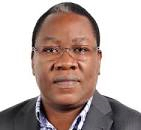
Dr Freddie Ssengooba is an Associate Professor of Health Economics and Health Systems Management with over 20 years of teaching and research in health policy and systems. He is the Chair of Health Policy Planning & Management (HPPM) department and Director SPEED Project and the Center for Health Policy and Systems Development (CHPSD) at Makerere University School of Public Health. Dr. Ssengooba has background training as a medical doctor and has worked in a clinical setting, as a hospital director and as a District Health Officer in Uganda’s health system. He has a doctorate covering the intersection of public health policy and institutional economics from the University of London. In the last 17 years, Dr Ssengooba’s teaching and research scholarship have focused health policies, program design and implementation and health system developments.
Dr Ssengooba has led a multi-disciplinary team undertaking Health Systems Assessment for Uganda, National Maternal Health Review and consultative study to operationalize national plans such as safe male circumcision for HIV prevention, reproductive health and health workforce and financing reforms. Dr Ssengooba is well embedded in the national and regional health and development discourses, think-tank taskforces and as advisory boards for health agencies like National Planning Authority, WHO-AFRO, Wellcome Trust, KEMRI and Health Systems Global. He is well versed in quantitative and qualitative research methods drawing on multiple lenses and disciplines such as human medicine, public health, health economics, political economy and systems thinking. As a director of SPEED Project - a program of applied policy analyses to support universal coverage in Uganda,
Dr Ssengooba leads a partnership of agencies to respond to policy problems and demand for advice from the government of Uganda. From these enterprises, Dr Ssengooba has published books, journal articles, working papers and Op-Eds. He has supervised to completion nine doctoral fellows and over 30 masters student in his field of expertise. He has provided technical and consultancy services to WHO, DFID, USAID, World Bank, Ministries of Health, Uganda AIDS Commission and Multi-lateral and Bilateral Agencies and Foundations.
Augustino Ting Mayai
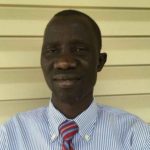
Augustino Ting Mayai is the Director of Research at the Sudd Institute and an Assistant Professor at the University of Juba’s School of Public Service. He holds a PhD in Sociology, with concentrations on demography and development from the University of Wisconsin-Madison. He currently studies how state effectiveness affects child health outcomes in South Sudan and Ethiopia. Dr. Mayai has written extensively on South Sudan’s current affairs.
Tumani Corrah
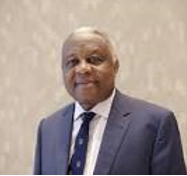
Tumani Corrah CBE FRCP is a Gambian clinician whose fields of research include tuberculosis, HIV and malaria. Corrah is Director of the Africa Research Excellence Fund (AREF) and Director, Africa Research Development, Medical Research Council. In 2007 Corrah was awarded an Honorary CBE.
Tumani Corrah studied medicine at the First Pavlov State Medical University of St Petersburg, Russia and University College Ibadan, Nigeria. In the late seventies he went to the UK, first to Edinburgh then to Wales, where he trained for his Membership of the Royal College of Physicians as a chest physician in the Department of Medicine, Gwynedd General Hospital. In 1981, after obtaining his MRCP he was appointed consultant physician.
In 2014 Tumani Corrah was awarded the title of Emeritus Director of the MRC Unit in the Gambia and was awarded an Honorary Fellowship by The London School of Hygiene and Tropical Medicine in recognition of his outstanding contribution to the progress of clinical research in The Gambia and in West Africa as a whole. Corrah was elected Board Chair of Trustees for The INDEPTH Network on 15 March 2017. He has served as an adviser to many organisations including the World Health Organisation. Corrah has been a host of the Falling Walls conference and has published over 140 publications in peer reviewed journals and his most recent work has focused on tuberculosis, pneumonia and the role of leadership in people-centred health systems.
Jean De Dieu Marie Rakotomanga (Member AACHRD)
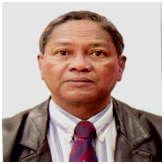
Professor of Public Health, University of Antananarivo · Department of Public Health. He is the Director of the National Institute of Public and Community Health. The Institution is the driving force behind the training of health workers in accordance with national health policies in the country and has made many landmark achievement in health care delivery in the country.
Selection and appointment |
AACHRD members are recruited and selected as acknowledged experts within the African Region in the fields of health research and development relevant to the Strategic Directions of the WHO African Region and the overall Strategic Objectives of the World Health Organization4.
The membership of the AACHRD shall seek to reflect a representative of:
- Professional affiliation (e.g., academia, medical profession, clinical practice, research institutes, and government bodies including national and regional networks for research, professional associations, WHO collaborating centres, public health departments and regulatory authorities);
- Major areas of expertise (e.g., formulation of policy guidelines; health systems and Primary Health Care; health of the Mother, Child, Adolescent and Elderly; prevention and control of communicable and non-communicable diseases; Financing and coordination of Research; Bioethics); and
- The two core functions of WHO relating the generation, translation and dissemination of valuable knowledge; articulating ethnical and evidence based policy options.
AACHRD members, including the Chairperson; are selected on the basis of their qualifications and ability to contribute to the accomplishment of AACHRD’s objectives.
They are appointed by the WHO Regional Director. All nominations for new AACHRD members, as well as renewals and discontinuation of appointments to AACHRD, must be approved by the WHO Regional Director. Consideration will be given to ensuring appropriate geographic representation and gender balance.
Members of AACRD, including the Chairperson, shall be appointed to serve for an initial term of three years. Such three-year terms may be renewed once.
Prior to being appointed as AACHRD members and prior to renewal of term, nominees and current AACHRD members shall be required to complete a WHO declaration of interest.
In addition, prior to confirmation by WHO of their appointment as AACHRD members, AACHRD nominees shall be required to sign a confidential agreement (Annex2). All papers presented to AACHRD, which may include prepublication copies of research reports or documents of commercial significance, shall be treated as confidential by AACHRD members.
Roles and responsibilities of AACHRD Members:
Members of AACHRD have a responsibility to provide WHO with high quality, well considered, advice and recommendations on matters described in the AACHRD terms of reference that will guide Member States in the WHO African Region accelerate progress towards regional and global targets for the implementation of research for health and development goals. Members play a critical role in ensuring the reputation of AACHRD as an internationally recognized advisory group in the field of research for health. In keeping with AACHRD’s mandate to provide strategic advice rather than technical input, members will be recommitted to the development and improvement of public health policies. Where necessary, focused technical input will be solicited from identified experts advisory scientific groups.
The Committee has no executive or regulatory function. Its role is solely to provide advice and recommendations to the WHO Regional Director, and includes providing advice and recommendations on urgent matters as needed.
AACHRD members may be approached by non-WHO sources for their views, comments and statements or particular matters of public health concern and asked to state the views of AACHRD. AACHRD members shall refer such enquiries to WHO.



